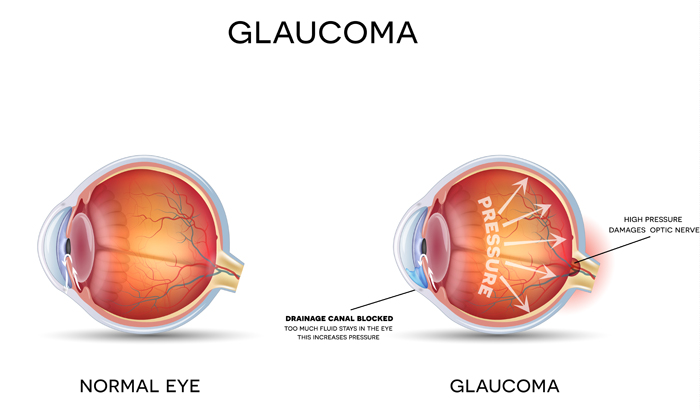Glaucoma Treatment & Diagnostics in Karol Bagh, Delhi
Glaucoma
Introduction
Glaucoma is a group of eye diseases that involve damage to the optic nerve. Glaucoma is caused by several factors such as high blood pressure and decreased flow of blood to the optic nerve.
Glaucoma is diagnosed by conducting a tonometry test that assesses the level of internal pressure in the eye. The doctor may also use a perimeter test to assess the field of vision of the patient. Glaucoma is treated by using eye drops or surgery is performed.

Types of Glaucoma
There are five types of Glaucoma. They are:
- Angle-Closure (Acute) Glaucoma - This is the worst type of glaucoma. In this condition, fluid builds up in the eye, causing extreme pain in the eye. This would require immediate medical attention.
- Congenital Glaucoma - This is the type of glaucoma where a child is born with the disease. This slows down their fluid drainage.
- Secondary Glaucoma - This type of glaucoma is the result of an eye injury or another eye condition such as a cataract.
- Open-Angle (Chronic) Glaucoma - This is the most common type of glaucoma. This results in slow and gradual loss of vision.
- Normal-Tension Glaucoma - This is a rare type of glaucoma where damage to the optic nerve is seen without a known cause. Researchers have attributed this to the optic nerve.
Symptoms of Glaucoma
These are the following symptoms of Glaucoma. They are:
- Extreme pain in the eyes
- High blood pressure
- Blurred vision
- Redness in the eye
- Nausea
- Vomiting
- Patches of the blind spot in your vision
- Headache
Causes of Glaucoma
There are a few factors that cause Glaucoma. They are:
- The buildup of the fluid is called aqueous humor in the eye. This in turn causes damage to the optic nerve.
- Decreased blood flow to the optic nerve.
- Dilated eye drops
- Increase in blood pressure
- Reduced drainage of fluid in the eye
When to Visit a Doctor
If you experience any of the following symptoms such as blurred vision, patchy spots in your vision, tunnel vision, extreme pain in the eye, then you must visit your doctor immediately.
Request an appointment at Apollo Spectra Hospitals, Karol Bagh, New Delhi
Call 1860 500 2244 to book an appointment
Risk Factors Associated with Glaucoma
Certain factors make you more vulnerable to developing glaucoma. They are:
- People over the age of 60 are at an increased risk of developing glaucoma
- Family history of glaucoma
- Other eye conditions such as cataracts, injuries.
- People with a medical history of conditions such as diabetes and high blood pressure.
Treating Glaucoma
Your doctor will create a treatment plan to reduce the pressure in your eyes and also to avoid any loss of sight. These are the following ways to treat Glaucoma.
- Medications - Your doctor will prescribe eye drops drills that will help decrease the pressure in your optic nerve. It can either improve the fluid drainage of your eyes or reduce the amount of fluid your eye makes.
- Surgery - In the surgery, the doctor creates a path in your eye that will allow fluid to drain. Another option is the doctor will destroy the tissues that are causing the pressure in your eyes to increase. Another procedure called peripheral iridotomy is performed where the doctor makes a hole in the iris to allow the fluid to move.
Request an appointment at Apollo Spectra Hospitals, Karol Bagh, New Delhi
Call 1860 500 2244 to book an appointment
Conclusion
Glaucoma is a group of eye diseases that involve damage to the optic nerve due to the buildup of fluid in the eye. Glaucoma is caused by several factors such as high blood pressure, decreased flow of blood to the optic nerve. Glaucoma is treated by using eye drops or surgery to drain the fluid from the eye.
Yes. Glaucoma has no cure. Vision loss due to glaucoma cannot be treated.
No. Glaucoma cannot be prevented. Early diagnosis of the problem can help slow down the damage caused by the disease.
If your child has a family history of glaucoma, there are high chances that your child may develop glaucoma.
Our Top Specialities
NOTICE BOARD
CONTACT US
CONTACT US
 Book Appointment
Book Appointment


.svg)
.svg)
.svg)
.svg)








